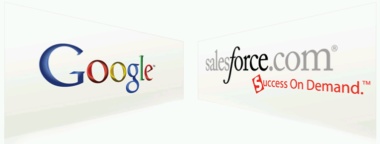Salesforce unveils its Google alliance

The core of the announcement is a new product offering called 'Salesforce.com Group Edition featuring Google AdWords', pitched at the small business market with a license fee of €10 per user per month (presumably the US pricing is $10 [update: it is — Dan Farber has more details]; also US users get a $50 credit towards their AdWords spend; a pity that isn't being offered in Europe too).
This is not an earth-shattering announcement but from what Lindsey is saying, it seems that Salesforce.com is going to milk it for all it's worth (and probably much more). The positioning seems to be that this is a demonstration of what can happen when two such powerhouses of the on-demand industry get together. Lindsey is citing the rapid time-to-market of the new product and is describing it as "a trojan horse into the SMB marketplace." That at least may prove to be true. Take-up of AdWords by the 'long tail' of small businesses has been a part of its success, but to get the best out of an AdWords campaign it needs to be supplemented by the kind of software that the new product is now offering at a low entry price. It may well help both Salesforce.com and Google consolidate and extend their presence in the SMB market.
It has been "jointly developed" by the two companies, according to Salesforce.com's spokesperson. But there's no one from Google on the call, allegedly because they'll be participating in the Californian event later on. An interesting nugget that has come out in response to a journalist's question is that Salesforce.com will be getting a small cut of the AdWords revenue generated through using the product. This product therefore represent's Salesforce.com's first step into partially ad-funded revenues (as people will call it although it should more properly be defined as an affiliate revenue stream). That probably is the most significant element of today's announcement.
A secondary part of the announcement is to highlight the ability to access the AdWords API via Salesforce.com's Apex platform (which is a by-product of the recently introduced Salesforce SOA capability). Specialist Salesforce.com integrator Appirio has been given star billing in this part of the presentation. The company recently added several Google widgets to AppExchange and today is unveiling another: the AdWords Analyzer.
The story behind Appirio's widgets is that they were inspired by a feature request that a user posted to the IdeaExchange, Salesforce.com's bulletin board for posting and discussing feature requests. Now there's a new page on the IdeaExchange for requesting new features that leverage Salesforce.com and Google: ideas.salesforce.com/popular/google. No doubt Salesforce is hoping this will generate some more fresh ideas.
Overall I get the sense that this alliance means a lot more to Salesforce.com than it does to Google. After all, Google's market share of the SMB segment is massively larger than Salesforce.com's. Also, the smaller companies that make use of AdWords are very price sensitive and Salesforce.com has probably been losing out to lower-priced competitors. Teaming up with Google lets Salesforce.com test an aggressive new price point without directly undercutting its existing products; it also, as mentioned above, allows Salesforce.com to get a taste of indirect funding as an alternative to pure subscription pricing.
I'm sure many Google watchers will be massively disappointed that the two companies have not put Google Apps together with Salesforce.com to provide a more tightly integrated suite of products that might steal customers from Microsoft. But that might yet be on the future roadmap, if Salesforce.com can prove itself a worthy partner for Google by making a success of this first collaboration.
